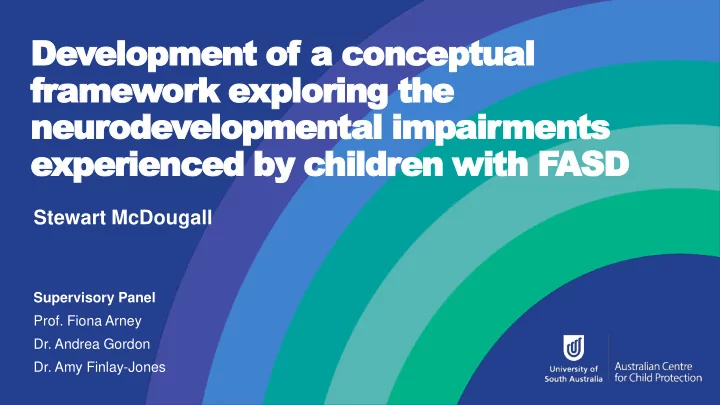

Development of a conceptual framework exploring the neurodevelopmental impairments experienced by children with FASD Stewart McDougall Supervisory Panel Prof. Fiona Arney Dr. Andrea Gordon Dr. Amy Finlay-Jones
Background – Neurodevelopmental profile of FASD: the outward expression (behavioural and developmental) of the central nervous system damage caused by prenatal alcohol exposure (Lange, Rovet, Rehm & Popova, 2017). – Caregiver behavioural ratings have the potential to be used in the development of a screening tool, to identify children most in need of a full multi-disciplinary assessments (Lange et al., 2017) – Understanding of the neurodevelopmental profile of FASD is constantly evolving
Background – Aim of the research was to develop a new screening tool to identify children at risk for FASD, focusing on the 4 to 12 age group due to the benefits of early intervention – Identify the children who would benefit most from referral for assessment with a multi-disciplinary team
Scoping Clinician Caregiver review interviews interviews (n=72 (n=5) (n=15) studies) Develop conceptual model to identify relevant disease-specific domains and issues Item generation based on conceptual model Content validity phase Expert review of proposed items Refine measure based on expert review and format validation ready version Conduct validation study and refine measure based on findings Measurement property psychometric phase Final measure Adapted from Brod et al (2009).
Domains Method group Key findings FASD ALC LONG • Executive function, 16 5 9 Greater difficulties on more demanding tasks. • hyperactivity and Mixed results on inhibition tasks (e.g., the Stroop Test) • impulsivity Poorer working memory ability across a range of measures • Higher levels of hyperactivity and impulsivity as rated by caregivers and teachers. • Adaptive Behaviour, 15 4 0 Poorer adaptive behaviours compared to peers. • social skills and social Lower social skills as rated by caregivers, but not by teachers. • communication Higher levels of problematic behaviour in social settings as rated by both caregivers and teachers. • Greater difficulty in the recognition/discrimination of emotions, particularly when less information available. • Academic Achievement 7 2 4 Poorer academic ability generally, particular deficit noted in mathematics tasks. • Poorer performance on more demanding literacy tasks such as spelling a dictated word, compared to identification of visually presented letters. • Motor skills 11 1 4 Impairments in composite and fine motor skills, soft-neurological signs and visual-motor integration. • Mixed results for gross motor skills • Language 8 3 0 Poorer receptive and expressive language skills • Affect regulation 3 0 7 Mixed results on internalising behaviour measures. • Children with FASD had greater numbers of mood and anxiety disorder symptoms in one study. • Attention 4 2 4 Mixed results on direct assessments (e.g., Continuous Performance Test) of attention • Caregivers and teachers consistently rated children as having greater attention difficulties • Memory 3 3 2 More impaired on verbal memory tasks, compared to non-verbal memory tasks.
Findings outside the Australian Diagnostic Guideline domains Domains Method group Key findings FASD ALC LONG • FASD-specific 8 0 0 As expected, children with FASD scored significantly higher than peers on measures behavior scales intended to captures behaviours associated with FASD • Sensory processing 3 0 0 Greater number of sensory processing concerns (e.g., high pain tolerance, heightened reactivity to • Sleep 2 0 0 Greater number of behaviours associated with sleep disorders (e.g., bedtime resistance, night time awakenings) • Fewer hours of sleep overall
What did caregivers tell us about the strengths and difficulties of their children?
Major themes
Conclusions and future directions – The development of the screening tool drew heavily on the experiences and expressions of the caregivers and clinicians – Sample items: – Has outbursts for little apparent reason – Appears to act without thinking – Needs more help from an adult to stay on task
Thank you We are currently recruiting for the final study , if you are interested in participating come and see me after this presentation Stewart McDougall Australian Centre for Child Protection, University of South Australia www.unisa.edu.au/accp stewart.mcdougall@unisa.edu.au
Recommend
More recommend